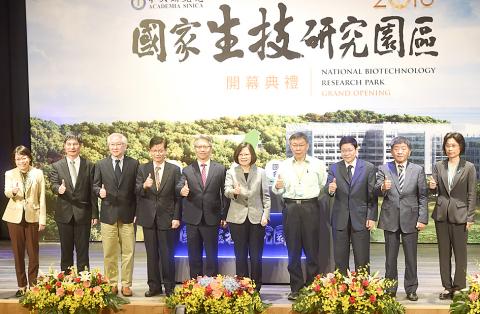President Tsai Ing-wen (蔡英文) yesterday inaugurated the National Biotechnology Research Park in Taipei’s Nangang District (南港), saying its opening marks a giant step in the development of the nation’s biotech industry.
The park houses the Ministry of Health and Welfare’s Food and Drug Administration, the Ministry of Science and Technology’s National Laboratory Animal Center, the Ministry of Economic Affairs’ Development Center for Biotechnology, an incubation center, two Academia Sinica research centers and a bioinformatics center.
While some of the agencies moved in last year, the park’s inauguration had been put off several times.

Photo: Chien Jung-fong, Taipei Times
With Academia Sinica leading the project and a budget of more than NT$20 billion (US$646.4 million), the park was set up on a site that used to house the Ministry of National Defense’s 202nd Arsenal.
“Taiwan’s essential competitiveness in the next generation will stem from the biotech and biomedical industries,” Tsai said in her speech at the opening, expressing her hope that the park would be connected with the Hsinchu Biomedical Science Park to form an industrial corridor.
Aided by the passage of amendments to the Fundamental Science and Technology Act (科學技術基本法) and the Act for the Development of Biotech and New Pharmaceuticals Industry (生技新藥產業發展條例) last year, the nation’s biotech industry should be able to attract more talented people, she said.
The project had been overseen by three former presidents — Lee Teng-hui (李登輝), Chen Shui-bian (陳水扁) and Ma Ying-jeou (馬英九) — as well as Tsai and Vice President Chen Chien-jen (陳建仁), Academia Sinica President James Liao (廖俊智) said, adding that two of the institute’s former presidents, Lee Yuan-tseh (李遠哲) and Wong Chi-huey (翁啟惠), also provided vital contributions.
Given environmental groups’ concern over the project’s potential impact on local species, the institution has restricted buildings to 3 hectares, while maintaining a 4-hectare ecological pool and reserving the rest for ecological restoration, Liao said.
The park is to be managed by a cross-agency committee, with Academia Sinica academician Andrew Wang (王惠鈞) serving as acting chief executive and National Taiwan University animal science professor Ding Shih-torng (丁詩同), who is also the director of the park’s incubation center, as its acting deputy executive.

Intelligence agents have recorded 510,000 instances of “controversial information” being spread online by the Chinese Communist Party (CCP) so far this year, the National Security Bureau (NSB) said in a report yesterday, as it warned of artificial intelligence (AI) being employed to generate destabilizing misinformation. The bureau submitted a written report to the Legislative Yuan in preparation for National Security Bureau Director-General Tsai Ming-yen’s (蔡明彥) appearance before the Foreign Affairs and National Defense Committee today. The CCP has been using cognitive warfare to divide Taiwanese society by commenting on controversial issues such as Taiwan Semiconductor Manufacturing Co’s (TSMC, 台積電) investments in the

INVESTIGATION: The case is the latest instance of a DPP figure being implicated in an espionage network accused of allegedly leaking information to Chinese intelligence Democratic Progressive Party (DPP) member Ho Jen-chieh (何仁傑) was detained and held incommunicado yesterday on suspicion of spying for China during his tenure as assistant to then-minister of foreign affairs Joseph Wu (吳釗燮). The Taipei District Prosecutors’ Office said Ho was implicated during its investigation into alleged spying activities by former Presidential Office consultant Wu Shang-yu (吳尚雨). Prosecutors said there is reason to believe Ho breached the National Security Act (國家安全法) by leaking classified Ministry of Foreign Affairs information to Chinese intelligence. Following interrogation, prosecutors petitioned the Taipei District Court to detain Ho, citing concerns over potential collusion or tampering of evidence. The

‘COMPREHENSIVE PLAN’: Lin Chia-lung said that the government was ready to talk about a variety of issues, including investment in and purchases from the US The National Stabilization Fund (NSF) yesterday announced that it would step in to staunch stock market losses for the ninth time in the nation’s history. An NSF board meeting, originally scheduled for Monday next week, was moved to yesterday after stocks plummeted in the wake of US President Donald Trump’s announcement of 32 percent tariffs on Taiwan on Wednesday last week. Board members voted to support the stock market with the NT$500 billion (US$15.15 billion) fund, with injections of funds to begin as soon as today. The NSF in 2000 injected NT$120 billion to stabilize stocks, the most ever. The lowest amount it

NEGOTIATIONS: Taiwan has good relations with Washington and the outlook for the negotiations looks promising, Minister of Economic Affairs J.W. Kuo said Taiwan’s GDP growth this year is expected to decrease by 0.43 to 1.61 percentage points due to the effects of US tariffs, National Development Council (NDC) Minister Paul Liu (劉鏡清) said at a meeting of the legislature’s Economics Committee in Taipei yesterday, citing a preliminary estimate by a private research institution. Taiwan’s economy would be significantly affected by the 32 percent “reciprocal” tariffs slapped by the US, which took effect yesterday, Liu said, adding that GDP growth could fall below 3 percent and potentially even dip below 2 percent to 1.53 percent this year. The council has commissioned another institution